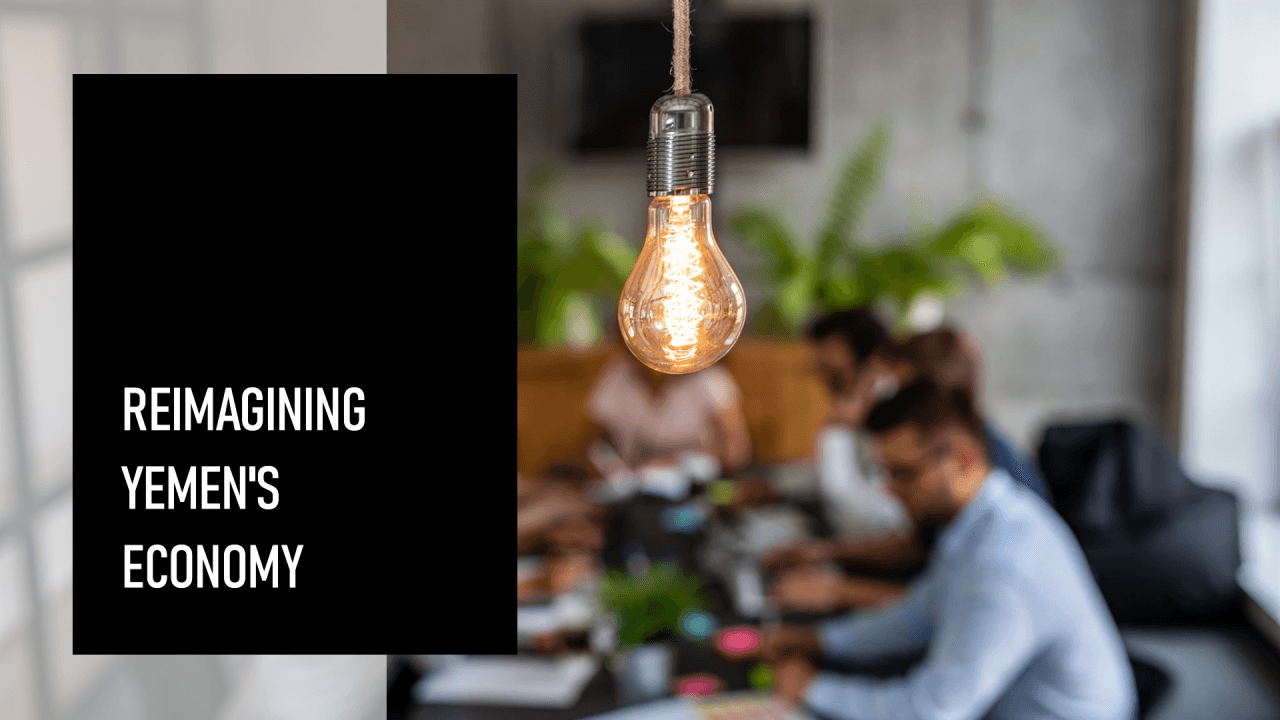I wrote this piece a while back while attending a course on Impact Investing. I believe an innovation and impact fund in Yemen and other fragile and conflict countries will have great and positive impact on economic stability, growth and peace.
The piece summarizes my thoughts on the importance of introducing an Innovation and Impact Fund in Yemen even during conflict, and the considerations to be discussed as this being done. I am hoping this will help engage those interested whether in Yemen or in countries with similar challenges to structure the conversation, feedback, and efforts. I am touching a bit on all the various aspects of building a fund, therefore, please do start sharing comments or contact me for side discussion as your ideas and points come to you.
I am publishing it now, as a new partnership is being launched, kicking of a serious effort to make this a reality.
Introduction:
Existing finance channels in Yemen ignore innovative and impact-driven entrepreneurship and instead focus on necessity-based entrepreneurship. The humanitarian context of Yemen and the dire need of a large portion of the population for assistance (over 18.2 million ppl are in need) led international finance efforts in Yemen to focus on essential food, health services, and other humanitarian work. With no venture capital available, Yemeni innovators and entrepreneurs with the capacity to create impactful and growth-oriented projects are left to manage on their own or shift their focus due to the overwhelming challenges. From my personal observations, those with the ability and talent to pioneer new, innovative solutions or companies often either seek employment with international NGOs, or leave the country for more welcoming environments. Both of these outcomes deprive the country of much-needed adaptive and innovative solutions to its major local challenges.
A Yemen Innovation and Impact Fund can enable innovative entrepreneurs living in Yemen to continue working on local challenges and solutions. These entrepreneurs could create businesses that generate jobs, provide essential services, and contribute to economic stability and peacebuilding efforts. The supported startups could also play a significant role in post-conflict reconstruction and economic rebuilding.
In response to COVID-19, countries and organizations around the world mobilized their entrepreneurs and innovators to tackle the challenges the pandemic introduced. Those with well-established entrepreneurship and innovation ecosystems were better positioned to benefit from the creativity of their entrepreneurs. In Yemen, we organized a COVID-19 virtual hackathon that attracted over 1,000 entrepreneurs and professionals, with more than 200 projects submitted. More recently, I oversaw the implementation of a Social Innovation Lab and Hackathon to address agriculture production challenges in Yemen. I witnessed similar levels of enthusiasm and drive from local innovators, with about 1,000 applicants and over 400 submitted solutions.
While creativity and innovation in Yemen are not lacking, the ecosystem is missing a key stakeholder—financing for innovative approaches and startups . In a 2021 mapping of the entrepreneurship ecosystem in four Yemeni cities, the most obvious gap was the absence of risk or venture capital stakeholders.

Yemeni entrepreneurs working on innovative solutions can also advocate for peace dividends and system changes that improve governance and create a business environment more conducive to entrepreneurship. These entrepreneurs’ impact “may include helping victims of war and civil strife to recover and build new lives, creating jobs and inclusive opportunities for affected communities, or providing public goods where normal services are unavailable.”
Given that there is no entrepreneurial finance in Yemen, the introduction of “risk capital” should consider the entire cycle of entrepreneurial finance, supporting entrepreneurs as they build high-growth companies from inception to maturation. The proposed fund should focus on the pre-seeding and acceleration stages while ensuring that subsequent rounds of investment are available as companies grow. This fund would also contribute to achieving Yemen’s sustainable development goals, particularly those related to inclusive economic growth and decent work for all (SDG 8), resilient infrastructure and innovation (SDG 9), reduced inequality (SDG 10), and the promotion of peaceful and inclusive societies (SDG 16).
Investors:
When considering potential investors, it is important to understand both the expected returns and their motives. The returns from the fund should not only be monetary but also social, with a primary focus on recognizing the fund’s role as the first of its kind in Yemen, paving the way for future funds.
Monetary Returns
The fund will be created to support entrepreneurs who can build Innovation-Driven Enterprises (IDEs) that are both impact- and growth-focused. These enterprises could provide much-needed services in Yemen, export Yemeni-based products to the world, develop innovative solutions to major challenges (such as those posed by COVID-19), or leverage local talent and technology for regional and global markets. However, investors will need to adopt a patient capital approach, understanding that the situation and context will require giving these businesses time to develop infrastructure, markets, and frameworks to reach their full potential. While some of these startups may generate substantial returns, investors should not expect the same multiples they would typically seek in more advanced and stable economies. Investors will need to balance the need for sustainable capital growth with the impact being made and the infrastructure built by these pioneering companies. In effect, most innovative startups in Yemen are market-creating ventures (one example being “Wagabat“).
Social Returns
Investors providing the initial funding should have a strong interest in the development of Yemen’s entrepreneurship ecosystem and in the long-term benefits and ultimate impact of this initiative, particularly in terms of economic development, peacebuilding, and post-conflict stability. Given the spectrum of social impact investments, this fund should be seen as a below-market return asset, with a greater focus on impact, even if the financial returns eventually align with market rates. These expectations will limit the type of investors that are likely to engage. The fund might appeal to multilateral development banks or donors and could leverage the concept of blended finance to encourage private investors by providing guarantees or covering extra overheads through development finance.

One key group to consider as investors in the fund is the Yemeni diaspora. The Yemeni diaspora sends around USD 3.77 billion in remittances annually to Yemen, and Yemeni business-conglomerate families exist across the world. Yemeni diaspora has expressed interest in contributing to Yemen’s development and investing back in the country; however, no streamlined or trusted channel currently exists to connect them with opportunities. Moreover, the diaspora is likely to appreciate the value of the fund’s work beyond just solicitation, selection, and funding of businesses. They would also recognize the importance of ecosystem development and working with local authorities to support innovative entrepreneurs, ultimately creating an environment that could allow them to invest directly and on a larger scale in the future. However, these assumptions require further investigation. A Yemeni diaspora survey and mapping effort could be undertaken to explore their interest and attitudes toward the challenges and opportunities of investing in Yemen.
Investees:
It is difficult to imagine investing in countries where conflict remains unresolved; many challenges arise, including the number and quality of opportunities and entrepreneurs to invest in, the ability of those entrepreneurs to execute their projects in such a difficult environment, the legal frameworks needed to govern the relationship between investors and investees and whether those frameworks are enforceable, and the risk of destruction or loss if an entrepreneur’s project is directly targeted by one of the warring parties. When considering investees for the fund, it will be critical to examine each of these issues individually and develop strategies to understand and mitigate the challenges they present.
Geographical Location
Despite 10 years of war in Yemen, some cities have remained relatively stable and could serve as hubs for entrepreneurial activities. For example, Mareb city experienced rapid growth at one point due to its relative stability, which led to a real estate boom. Some Yemeni cities also benefit from having international airports and/or open land ports with neighboring countries, making them potential centers for economic and entrepreneurial activities.
In 2018, ROWAD Foundation conducted a market assessment for its entrepreneurship and employment projects and found that, even in areas experiencing violent conflict, local economic activity remained active, and microfinance was actually growing, including in cities like Sanaa and Taiz. The Yemen Entrepreneurs Fund will need to conduct a similar assessment of potential cities for its activities. This assessment should identify the main risks to entrepreneurial activity and also evaluate the institutions/organizations (such as academic institutions, NGOs, etc.) that are currently supporting potential innovative entrepreneurs who could benefit from the fund.
Selecting Entrepreneurs
In a national business competition (Afkar Yemen – Youth Innovation Award) run by ROWAD in 2014 with support from UNDP, over 4,000 entrepreneurs applied, highlighting how access to finance and support can motivate local entrepreneurs to focus on innovative and growth-oriented startups.
The fund will bear the risk of creating a market where entrepreneurs and impact investors collaborate to build new businesses. When selecting startups to invest in, the fund will need to establish a clear due-diligence process, taking into account the stage of the startup, the capabilities of the team, the potential for impact, and the sector. For example, in recent years, Yemen’s specialty coffee sector has evolved, with more sophisticated business-models started by Yemeni entrepreneurs who leveraged their deep understanding of local coffee production, established relationships with international importers, and managed the complex logistics of exporting products during conflict.
Furthermore, to build a pipeline of investable ideas, the fund could collaborate with existing entrepreneurship support organizations (e.g., ROWAD, Mahta, SMEPS, Hadef, Super-Novae, etc.) to develop pre-seed acceleration programs that could lead to investments if the graduating ideas meet the fund’s investment criteria.
Capacity to Grow
Building growth-oriented businesses requires not only technical expertise but also the knowledge of how to manage a startup for growth. Yemen has not seen many startups scale into large businesses, so the fund will need to ensure that this knowledge is made available to local entrepreneurs.
Ensuring that startups have the right board members with the necessary experience, and linking local entrepreneurs with experienced mentors, will be essential. While the fund will seek to engage the Yemeni diaspora for initial funding, it can also rely on this same diaspora for expertise in managing growth. Moreover, the fund could establish relationships with the growing entrepreneurship ecosystems in the region to access mentors and develop welcoming import markets.
The Legal Framework
One of the main challenges the fund will face is the legal framework in Yemen, which lacks the structures readily available elsewhere to facilitate contractual agreements between investors and entrepreneurs. The current commercial law should be reviewed, and existing contractual forms should be evaluated to determine what can be done within the current setup to address contractual issues in a way that protects the rights of both the investor and the investee.
Another approach would be to evaluate the option of establishing companies outside of Yemen, allowing for the use of more developed legal frameworks. This could help reduce concerns for future investors.
Regardless of the approach, the fund will play a major role in shaping the development of a local legal framework as well as in building the capacity of local legal advisors and lawyers.
Risks
Operating in a conflict environment, the fund must ensure that the projects and entrepreneurs it invests in do not cause harm. While the conflict has devastated Yemen’s economy, it has also created certain opportunities, some of which can be unethical or even criminal. These opportunities may lead to growth, but such growth could be based on exploiting vulnerable customers who have no other options, or who would have better alternatives if the conflict were to end. The fund must ensure that it does not create incentives that support or prolong the war.
The fund will also need to avoid political polarization and ensure that it does not become entangled in the conflict or war economy. Navigating this balance requires adhering to humanitarian principles: humanity, neutrality, impartiality, and independence.
Additionally, the fund must guard against being exploited for money-laundering or other schemes that channel finances for illegitimate purposes. These risks are real and have serious consequences, which must be fully considered and addressed. The fund could learn from the experiences of reputable banks and financial services currently operating in Yemen and adopt the approaches those institutions use to mitigate such risks.
Management
The fund will require a diverse set of skills to successfully implement its mission. It is unlikely that many of these skills and knowledge will be readily available in the local market, given that no such fund has existed before. In addition to the expected skills of fund managers, the fund will need expertise related to managing the specific risks that arise from operating in a conflict environment, as well as skills to support entrepreneurs and help them build their capacities to implement and grow innovative, high-growth startups.
The fund will also need to develop credibility and trust with international and regional investors to ensure their participation in future rounds of investment. Fund management should have a strong local understanding and connections with Yemeni entrepreneurs and opportunities. Its role will be to leverage this local knowledge to link more financing to these entrepreneurs or help guide them into regional and international markets.
Funds operating in frontier and emerging markets have likely faced many of the challenges the Yemen Fund will encounter. Therefore, studying and connecting with these funds could provide valuable insights into the skills required and strategies for developing them.
To achieve the impact it seeks, the fund will have to play roles beyond those typically associated with a fund, including:
- Supporting entrepreneurs through multiple stages of their startup journey (from ideas and prototypes to growth and scaling),
- Providing not only financial resources but also expertise in starting and building growth-oriented businesses,
- Linking with funders outside the country, building on its in-depth local understanding and pipeline of supported businesses,
- Managing the risks of operating in a conflict environment while adhering to international financial regulations,
- Ensuring incentives are aligned with peacebuilding and development goals to avoid any introduction of harm.
Conclusion
The dire humanitarian situation in conflict-affected countries often dictates the priorities for intervention. However, this focus may crowd out private finance options that, while not directly aimed at humanitarian efforts, could still help reduce the humanitarian burden and contribute to peacebuilding through innovation, entrepreneurship, and private sector dynamics. Innovation-driven entrepreneurs may not align perfectly with the objectives of humanitarian interventions or livelihood projects, but their work can have significant, sustainable positive impacts on the very communities targeted by those efforts. Cooperation between providers of humanitarian finance and investment finance could lead to long-term effects, increasing peace dividends and helping to reduce the impact of conflict while creating incentives for its swift resolution.
While the conflict in Yemen is a unique case with its own specific causes and consequences, it is likely that entrepreneurs in other conflict-affected countries face similar challenges when it comes to accessing finance and contributing positively to peacebuilding and economic development. The lessons learned from the Yemen Entrepreneurs Fund could offer valuable insights for those looking to support entrepreneurs in similarly extreme conditions.
The introduction of an innovation and impact fund in Yemen offers a new pathway for growth, sustainability, and peacebuilding through the development of innovative businesses. By providing risk capital to support local entrepreneurs, we can create jobs, promote economic stability, and help pave the way for a brighter future in Yemen. The fund’s model of combining financial investment with capacity-building efforts can serve as an example for other conflict-affected regions facing similar challenges.



لا تعليقات